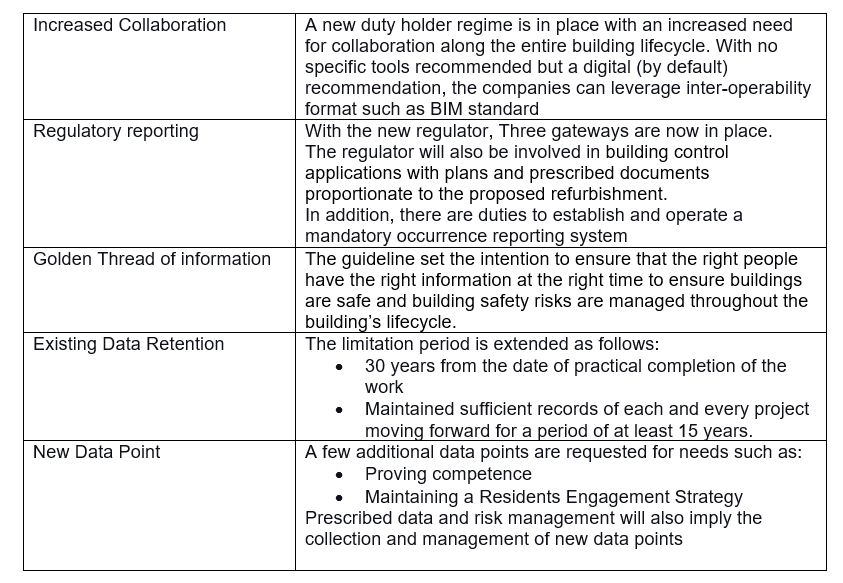With new duties introduced from 12th April 2023, the construction industry should be mobilising itself to fulfill its obligations starting with planning gateway one with the next milestones just around the corner. The Building Safety Act is a comprehensive change in the regulation with significant impacts on Data and how it should be managed.
The Building Safety Act 2022 has been widely discussed from a legal or liability lens, so let’s spend some time looking at it from a Data perspective.
The main requirements and changes related to Data :

The enablers
While there are specific elements related to Fire Safety and Higher Risk buildings, the Building Safety Act 2022 is a comprehensive review of the regulation, with building control authorities, regulations, and framework for all new buildings.
As such, there is alignment with current best practices that are supporting compliance with the Act.
- BIM is a major enabler. Providing processes with standards, it is a robust foundation framework with increasing adoption both from the industry as well as the technology solution providers. Some concepts, such as Golden Thread requirements, will be easier to implement if you already have in place BIM practices (requirements and models) at Project, Assets, and Organisation levels
- TQM for construction and continuous improvement activities is an additional enabler. If you have such an initiative in place, you are already collecting, combining, and using information across procurement, BIM, waste, safety, design, and construction management. TQM initiatives are an enabler to connect information together all along the building lifecycle. We can’t miss this opportunity to reference our Chairman John Oakland’s seminal book on Total Quality Management.
What else is needed?
While you may have design, schedule, planning, or quality tools and solutions in place, there is a new crucial need to manage your data proactively. This is quite a new practice and a crucial one for success.
The organisation capabilities
There is a risk of subjectivity in some of the expectations, for example, ‘relevant’ and ‘proportionate,’ especially when considering a much longer period of time of 30 years. Our data capability approach is designed to proactively manage and control data for ‘the right information at the right time for the right person:
- Data Quality: Is your information valid, relevant, and with the right level of quality?
- Data Catalogue: Do you have standards or definitions for your data, for example, when it comes to ‘competence’ or ‘forms’?
- Data Lineage: Do you know where your data is coming from, how it is modified or approved through which processes and systems? Can it be simplified?
- Master Data: Do you know how many times your data is replicated, copied and where are the golden records held?
- Data Governance: Do you have key business owners to drive the data requirements?
Those capabilities set the foundation for your data assets.
The data use cases
Information is not just managed to drive processes, activities, and completed definitions. Information and data are becoming the source of risk analysis, quality management, reporting, and process improvement.
To make it happen, we encourage companies to identify a few impactful use cases beyond the regulatory need. Those use cases will provide tangible benefits such as cost savings, waste reduction, or work optimisation.
The data use cases will make Data visible, and that will impact culture, literacy and support the Building Safety Act.
The data platform
We often have the question, do we need a data platform? The short answer is yes, as the only alternative will be to enter Excel Hell for a very long time!
Yet, we believe that the question should be, ‘What data platform is suited for my need.’ There are versatile platforms and systems, but without nailing down your needs, you will waste your investment and create red tape practices.
Based on the use case: reporting, MI, data quality monitoring, alerts, IoT, and real-time management or models, we can identify the best approach and platform to make your data visible and in the hands of the people who need it.
Your data culture and literacy
Finally, data culture and literacy are critical in your journey. Training and understanding the context of your data is the main enabler for a successful data journey. The objective is not to drive everything through data, but to understand everyone’s roles in data collection, management, and usage. Culture, literacy, and training are at the heart of trust, good behaviours, and relevant prioritisation when it comes to data cleansing.
How Oakland can help
First, at Oakland, we have already supported construction companies with tangible use cases:
- Data Platforms
- IoT and models
- Reporting needs and data improvement
- Data Quality assessment
In our engagements, we are careful to make sure that our activities are aligned with where you are now, your priorities and challenges, and your transformation approach for the future.
If you are struggling with any aspect of the Building Safety Act then please get in touch by emailing hello@theoaklandgroup.co.uk
Frank Brugnot is a Principal Consultant at Oakland

